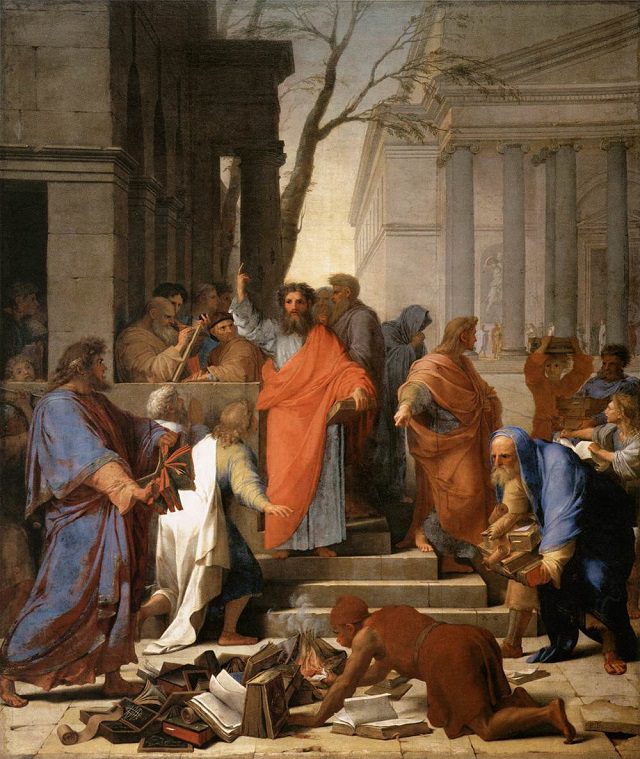
The Preaching of St Paul at Ephesus (1649), by Eustache Le Sueur (1617-1655) [public domain / Wikimedia Commons]
***
(12-3-96 and 1-4-97)
***
In response to the opinion of many Protestants that Catholics are not Christians (which word I define in an “orthodox,” “creedal,” “confessional,” “doctrinal” sense, not in the “wheat and tares,” individual commitment to Christ sense: both are valid), I wish to examine the question as to what constitutes the gospel.
In my written correspondence with Protestant scholars such as John Ankerberg and John Weldon, R. C. Sproul and others, I have taken up this question, drawing almost exclusively from research and beliefs from my Protestant days, completed long before I ever considered Catholicism. It’s quite curious to me that so many Protestants want to define the gospel in the strict sense of “justification by faith alone,” when the Bible itself is very explicit and clear that this is not the case at all.
For example, we know what the gospel is because we have a record of the apostles preaching it immediately after Pentecost. St. Peter’s first sermon in the Upper Room (Acts 2:22-40) is certainly the gospel, especially since 3000 people became Christians upon hearing it (2:41)! In it he utters not a word about “faith alone.” He instructs the hearers, rather, to “repent, and be baptized . . . so that your sins may be forgiven” (2:38). So, immediately after the Resurrection, at the very outset of the “Church Age,” an Apostle teaches sacramentalism and baptismal regeneration: anathema to most evangelicals.
St. Paul defines the gospel in Acts 13:16-41 as the Resurrection of Jesus (vss. 32-33), and in 1 Corinthians 15:1-8 as His death, burial, and Resurrection. When Paul converted, straightaway he also got baptized, in order to have his “sins washed away” (baptismal regeneration again). Biblical factors such as these caused people like Luther and Wesley and their denominations, and other communions like the Anglicans and Church of Christ to retain this doctrine.
Furthermore, when the rich young ruler asked Jesus how he could be saved (Lk 18:18-25), our Lord, accordingly, didn’t say “just believe in Me with faith alone.” No, He commanded him to perform a “work,” to sell all that he had. Jesus also rewards and grants salvation at least partially according to works and acts of charity, rather than on the basis of sola fide (Mt 16:27; 25:30-46 – note conjunction “for” in v.35).
So then, the explicit scriptural proclamations and definitions of the gospel strikingly exclude “faith alone,” while other actions by Jesus and the Apostles contradict it by force of example. Conclusion?: The gospel is – as Paul teaches – the death, burial and Resurrection of Jesus. This is the “good news,” not some technical soteriological theory. Even common sense would dictate that this “good news” is comprised of Jesus’ redemptive work for us: the great historical drama of His Incarnation and Atonement, not forensic, “legal,” imputed justification. And the prophets foretold these events, not a fine-tuned theory of application of those events to the believer — irregardless of whoever has the correct theory. How could a mere theological abstract reasonably be called “good news”?
It seems clear enough to me, yet otherwise brilliant, scholarly, learned people like Dr. Sproul (whom I enjoy very much on the radio) falsely accuse ecumenical Protestants like Chuck Colson, Bill Bright, and J. I. Packer (and by extension, people like Billy Graham, Ralph Reed, etc.) of “betraying the gospel” by their attempts to cooperate and have fellowship with Catholics as much as possible, and to find common theological ground (which is, of course, very considerable).
For these reasons and many others, it is, in my opinion, unconscionable for Protestants such as the afore-mentioned to read Catholicism (as a set of doctrines and dogmas) out of the Christian faith, since both sides fully accept all the supernatural facts of Christ’s divinity and man’s fallenness and believe that salvation comes solely as a result of His atoning work on our behalf — always ultimately His work of grace, whether or not works enter into the equation.
The contrary is Pelagianism, which was condemned by the Catholic Church in the 6th century at the 2nd Council of Orange. Also, both sides agree that good works ought to be present in every Christian’s life, whether they are required for salvation, or done in gratitude for salvation already accomplished. But if the devil wants to keep Christians divided, he has an easy task of it. Very sad . . .
*****
I was asked by a Protestant in the midst of an e-mail dialogue, “What is your hope of salvation?” I answered:
Jesus. Catechism of the Catholic Church (CCC), #169: “Salvation comes from God alone . . .” The Catechism goes on to speak of the role of the Church as “our teacher in the faith,” but not “as if she were the author of our salvation” (citing Faustus of Riez, De Spiritu Sancto, 1, 2: PL 62, 11).
The Second Council of Orange in A.D. 529 condemned all forms of Pelagianism, however “semi” (following St. Augustine), as did the Council of Trent. Yet the myths stubbornly persist . . . Shame on anyone who continues to hold them in the teeth of all Catholic replies to the contrary. It becomes a question of simple scholarly and intellectual honesty. I should think a healthy embarrassment, if not courtesy and honesty, would cause anti-Catholics to desire to “get it right” after a while . . .
My friend continued, asking, “This is the question of the Gospel. Is your salvation by grace alone through faith alone in Christ alone? Or is it grace plus something, faith plus something and Christ plus…?” I replied:
It’s not “grace +” anything. Rather, it is the elementary, eminently biblical recognition that “faith without works is dead,” and that we possess a “faith that works,” as I believe is the title of a book by John MacArthur. ALL SALVATION AND ALL GOOD WORKS WHATEVER DERIVE FROM GOD’S ENABLING AND NECESSARY GRACE ALONE.
I wish that anti-Catholic Protestants would define the gospel from the Bible alone (since that is supposedly the Protestant formal principle), as I have done. I define it straight from the Bible, whereas anti-Catholics want to define it according to a mere “tradition of men” (i.e., Luther’s). I find this quite tragi-comically ironic.
Catholics and Protestants both hold to the gospel as biblically defined above. We differ on questions of justification, which is the application of salvation and the gospel and Jesus’ work to the individual, not the gospel itself. Nor is TULIP (Calvinism) the gospel, strictly speaking. The key is the absolute primacy of grace and the utter condemnation of Pelagianism in both systems. Until that is understood, the anti-Catholic mentality is (I strongly believe) a self-defeating, even intellectually-suicidal position, since if Catholicism goes down on this point, Protestantism necessarily goes down with it.
There are, of course, major differences between the two camps, but on the central tenets of Christianity (e.g., doctrine of God, the life and works of Jesus, centrality of grace, the Bible, the fallenness of man, the total inability of man to save himself, creation, judgment, ethics, etc.) we are agreed. Catholics regard anyone baptized with a trinitarian formula as a Christian. Many Protestants think we are not Christians. But by what definition of “Christian” can they declare that? It is a ludicrously incoherent position. This is not just exaggerated hyperbole on my part, but what I literally and sincerely believe to be the case. And I wish anti-Catholics would tell me what their definition of gospel and Christian is, and how the Augustinian or Thomist “Catholic Church” is more to be identified with Protestantism than present-day Catholicism. It simply can’t be done. It is an arbitrary, trivial, futile, doomed, silly endeavor from the outset.
Yet I was told (after having painstakingly explained all this) that if I denied that salvation is “by grace alone through faith alone in Christ alone” that I was not a “brother in Christ.” This is a wicked, divisive tradition of men: the unnecessary collapsing of the explicit biblical explication of the gospel, the Good News, into a technical theological theory of its application.
I note with delight that there are many evangelical, conservative “orthodox” Protestant scholars (probably the vast majority) and other notables who agree with me on this, and differ with anti-Catholics, e.g.: Billy Graham, John Wesley, C. S. Lewis, Chuck Colson, J. I. Packer, Bill Bright, Os Guinness, Jaroslav Pelikan, Norman Geisler, Walter Martin, that part of Lutheranism which participated in the famous ecumenical dialogue with Catholics and on and on and on. It is anti-Catholicism which is the antiquated, unbiblical, irreparably illogical (and thus most uncharitable and slanderous) standpoint. Anti-Catholics are stuck in the hyper-polemical, tragic environment of the 16th century. We’ve learned much since then.
We can “fight” vigorously (yet amiably and respectfully) over our many disagreements, but there should be no division over whether we are brothers in Christ, or concerning the nature of the gospel. I couldn’t care less what anti-Catholics personally think of me, as they are a tiny minority in the Body of Christ and demonstrably gravely mistaken. But I do indeed care deeply about Christian unity, Christian ethics and love, the Bible and truth; hence my considerable passion on this subject.













